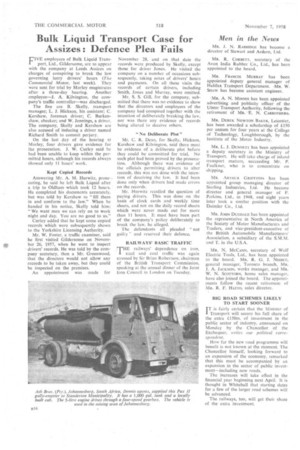Bulk Liquid Transport Case for Assizes : Defence Plea Fails
Page 50

If you've noticed an error in this article please click here to report it so we can fix it.
LIVE employees of Bulk Liquid Trans ' port, Ltd., Gildersome, are to appear with the company at Leeds Assizes on charges of conspiring to break the law governing lorry drivers' hours (The Commercial Motor, last week). They were sent for trial by Morley magistrates after a three-day hearing. Another employee—J. A. Kilvingtori, the company's traffic controller—was discharged.
The five are B. Skelly, transport manager; L. J. Hickson, his assistant; C. Kershaw, foreman driver; C. Burkenshaw, checker; and W. Jennings, a driver. The company, Skelly and Kershaw are also accused of inducing a driver named Richard Smith to commit perjury.
On the last day of the hearing at Morley, four drivers gave evidence for the prosecution. J. W. Curley said he had been unable to keep within the permitted hours, although his records always showed only 11 hours' work.
Kept Copied Records Answering Mr. A. M. Hurwitz, prosecuting, he said he left Bulk Liquid after a trip to Oldham which took 12 hours. He completed his documents accurately, but was told by Kershaw to "fill them in and conform to the law." When he handed in his notice, Skelly told him: "We want men we can rely on to work night and day. You are no good to us."
Curley added that he kept some copied records which were subsequently shown to the Yorkshire Licensing Authority.
Mr. W. Foster, a traffic examiner, said he first visited Gildersome on November 26, 1957, when he went to inspect drivers' records. He was told by the company secretary, then a Mr. Greenwood, that the directors would not allow any records to be taken away, but they could be inspected on the premises.
An appointment was made for November 28, and on that date the records were produced by Skelly, except those for driver Jones. He visited the company on a number of occasions subsequently, taking notes of drivers' hours and payments. On all these visits the records of certain drivers, including Smith, Jones and Murray, were omitted.
Mr. S. S. Gill, for the company, submitted that there was no evidence to show that the directors and employees of the company had conspired together with the intention of deliberately breaking the law, nor was there any evidence of records being altered to deceive others.
No Deliberate Plot"
Mr. C. R. Dean, for Skelly, Hickson, Kershaw and Kilvington, said there must be evidence of a deliberate plot before they could be committed for trial. No such plot had been proved by the prosecution. Although there was evidence of the officials permitting drivers to alter records, this was not done with the intention of deceiving the law. It had been done only when drivers had made errors on the records.
Mr. Hurwitz recalled the question of paying drivers. This was done on the basis of clock cards and weekly time sheets, and not on the daily record sheets which were never made out for more than 11 hours. It must have been part of the company's policy deliberately to break the law, he alleged.
The defendants all pleaded "not guilty " and reserved their defence.
RAILWAYS' BASIC TRAFFIC THE railways' dependence on iron, steel and coal traffic was again stressed by Sir Brian Robertson, chairman of the British Transport Commission, speaking at the annual dinner of the Joint Iron Council in I.ondon on Tuesday.












































































































































